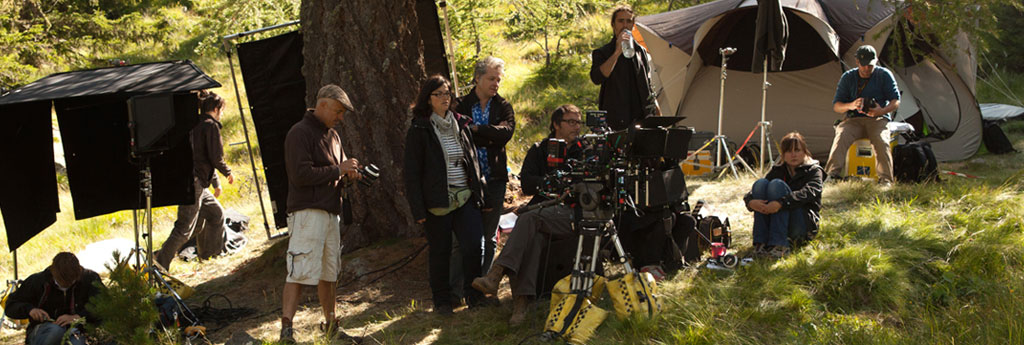
On the occasion of the 77th Cannes Film Festival, Ecoprod announced the winners of the 2024 Ecoprod award that honors films and their teams that exemplify outstanding practices in sustainable production. The award is designed to encourage and celebrate environmentally conscious practices in an industry known for its resource-intensive processes. The winners were selected a jury, which includes environmental activist and filmmaker Cyril Dion, director Antoine Barraud, producer Christine de Jekel and green production manager Pauline Gil.
The Ecoprod Award was given jointly to three films, which celebrate their premiere in Cannes. Jim’s story directed by Arnaud and Jean-Marie Larrieu, focused on sustainability issues at every stage of production. Filming was firmly rooted in the region, thanks to the training of local people in sustainable production management. The team also made sure to ensure the long-term viability of the project: a house built for the film is now used by the commune of Saint-Roman as a community center.
 The service providers and suppliers shared the production’s environmental commitments. For example, a partnership was forged with Esat Prestige in Saint Claude, a home for disabled workers with a carpentry workshop. Thanks to this partnership, the set design team was able to work with some of the residents, trained for the shooting, and could use their materials, such as wood. The old, weathered Clio that appears on screen was used to transport the actors, in order to limit the number of vehicles on set.
The service providers and suppliers shared the production’s environmental commitments. For example, a partnership was forged with Esat Prestige in Saint Claude, a home for disabled workers with a carpentry workshop. Thanks to this partnership, the set design team was able to work with some of the residents, trained for the shooting, and could use their materials, such as wood. The old, weathered Clio that appears on screen was used to transport the actors, in order to limit the number of vehicles on set.
“We are delighted to receive the Ecoprod Award, which recognizes the outstanding work of our green manager Mathieu Thill and the team spirit that has enabled us to place environmental issues at the heart of the day-to-day production of Jim’s Story. The measures we’ve implemented have allowed us to uphold this commitment without compromising the efficiency needed for filming. The Ecoprod award encourages us to continue on this path and reinforce our action", says the producer Kevin Chneiweiss.
Being Maria directed by Jessica Palud, impressed the jury due to the ecological commitment of the technical team. Set in the 1970s and 1980s, the protagonist Maria is a young, struggling actress with promise whose dream seems to become true when an emerging Italian director casts her to headline the film The Last Tango in Paris alongside an American superstar. But what seems like a big breakthrough turns out to be the start of a living hell.
As Mari a being a period film, one of the challenges in terms of environmental impact was linked to the construction of the set. The set design team, led by head designer Valérie Valéro, head painter Sabine Barthelemy and head builder Théo de Montalivet, strongly committed to eco-design and designed 90% of the sets using recycled materials and elements. The period wardrobe was created using mostly reclaimed and/or recycled elements (80% second-hand).
a being a period film, one of the challenges in terms of environmental impact was linked to the construction of the set. The set design team, led by head designer Valérie Valéro, head painter Sabine Barthelemy and head builder Théo de Montalivet, strongly committed to eco-design and designed 90% of the sets using recycled materials and elements. The period wardrobe was created using mostly reclaimed and/or recycled elements (80% second-hand).
“Winning the Ecoprod Award is the culmination of the efforts championed by the producer and the department heads. This recognition proves that green production works and that it can come at an equal or even lower cost than “business as usual” production. The Ecoprod Award shows that the carbon footprint of films can always be improved, and that there is nothing in the way of producing a difficult and ambitious film more sustainably .” Marielle Duigou, producer.

The Special Jury Award was awarded to Niki, the first feature film directed by Céline Sallette, who collaborated closely with the production manager in order to limit the environmental impact at every stage of production. From the outset, the strategy was conceived across all departments, taking into account both artistic choices and economic constraints.The production favored natural sets to avoid too much construction and limit waste. A very precise technical breakdown allowed the team to favor shooting with natural light. The teams innovated to avoid the use of motorized means of transport and heavy machinery, by renting, for example, cargo bikes to shoot the exterior dolly scenes. The shooting locations were chosen in areas accessible by public transport. The entire crew came to set with public transport, including the director and actors.
“Being singled out by the Ecoprod Award jury is a strong encouragement for the whole environmental commitment of Cinéfrance Studios. It’s a great honor for the film’s team, who have truly dedicated themselves to the project.” Géraldine Toitot, Production Administrator and Impact Manager at Cinéfrance Studios, a production company that recently announced its intention to certify 50% of its productions by 2024 with the Ecoprod Label.
 The Ecoprod Awards were hosted and handed out at the CST booth in Cannes. Baptiste Heynemann, CEO of the CST, and his team are celebrating the 80th anniversary of La Commission supérieure technique de l’image in Cannes.
The Ecoprod Awards were hosted and handed out at the CST booth in Cannes. Baptiste Heynemann, CEO of the CST, and his team are celebrating the 80th anniversary of La Commission supérieure technique de l’image in Cannes.
Photos: © GFS













 Robert Redford
Robert Redford Hannes Jaenicke
Hannes Jaenicke Nic Balthazar
Nic Balthazar Nadeshda Brennicke, Actress
Nadeshda Brennicke, Actress Darren Aronofsky, Director, Noah / Jury President, 65th Berlin International Film Festival
Darren Aronofsky, Director, Noah / Jury President, 65th Berlin International Film Festival Tim Bevan
Tim Bevan Thekla Reuten
Thekla Reuten Rachael Joy
Rachael Joy Nikola Rakocevi
Nikola Rakocevi Nadja Schildknecht
Nadja Schildknecht Michael Bully Herbig
Michael Bully Herbig Lars Jessen
Lars Jessen Helen Hunt
Helen Hunt Douglas Trumbull
Douglas Trumbull Dieter Kosslick, Director Berlin International Film Festival
Dieter Kosslick, Director Berlin International Film Festival Benoit Delhomme
Benoit Delhomme Jeremy Irons
Jeremy Irons